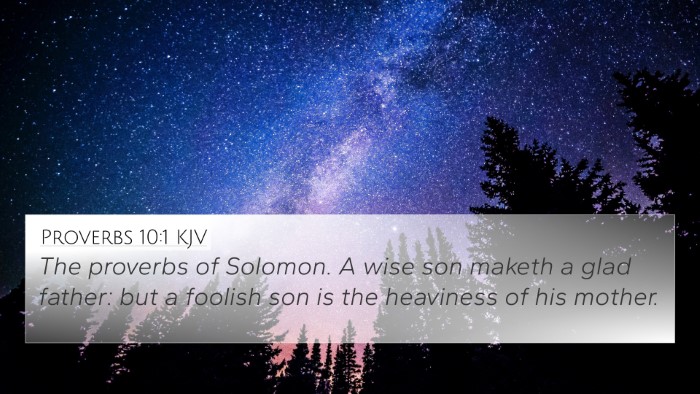Understanding Proverbs 17:25
Proverbs 17:25 states: "A foolish son is a grief to his father, and bitterness to her that bore him." This verse highlights the emotional turmoil and sorrow that can emerge from the actions of a foolish child, reflecting the profound connection between family dynamics and personal behavior.
Summary of Meaning
The essence of this verse signifies the impact of a child's foolishness on parents. The Hebrew term for "fool" implies a lack of wisdom and understanding, leading to regret and pain in familial relationships. The message is clear: the choices a child makes can deeply affect their parents' emotional well-being.
Insights from Public Domain Commentaries
Matthew Henry's Commentary
Matthew Henry places emphasis on the sorrow that a foolish son brings to his father. He articulates that such foolishness does not only represent a personal downfall but also inflicts deep emotional pain upon the parents, establishing the gravity of a child’s behavior on family harmony.
- The grief of a father can stem from the shame and disappointment due to a child's poor decisions.
- Parents experience bitterness in seeing their love and sacrifices for their child going to waste.
Albert Barnes' Notes
Albert Barnes elaborates on the relational aspect by contextualizing the roles of parents. He suggests that a wise son brings joy, while the opposite results in grief. Barnes' perspective stresses that the emotional landscape of family life is colored by the moral choices of its members.
- He highlights that the connection between parents and children is significant, where a child’s actions directly influence the family's emotional health.
- Furthermore, the term "bitterness" indicates a prolonged sense of sorrow that permeates family relationships due to folly.
Adam Clarke's Commentary
Adam Clarke provides a nuanced interpretation, noting the extent of disappointment that unfolds when a child fails to live in wisdom. He contemplates the cultural implications of foolishness within a familial context, indicating that this sorrow is a dynamic often observed in societies where family reputation is paramount.
- He emphasizes that the societal expectations can add to the parents’ grief, illustrating a broader cultural dynamic.
- Clarke’s insights also suggest that wisdom is not solely an internal quality but has external ramifications that influence how families interact with the world around them.
Bible Cross References
This verse resonates with several other scriptures that explore similar themes:
- Proverbs 10:1: "A wise son makes a glad father, but a foolish son is the sorrow of his mother." - This verse directly parallels the message of grief brought by a foolish child.
- Ephesians 6:1-3: "Children, obey your parents in the Lord: for this is right." - Highlighting the responsibility of children to honor their parents.
- Proverbs 13:1: "A wise son hears his father's instruction, but a scoffer does not listen to rebuke." - Underlining the consequences of rejecting parental guidance.
- Proverbs 15:20: "A wise son makes a glad father, but a foolish man despises his mother." - Reinforcing the emotional ties to parental disappointment.
- 1 Timothy 5:8: "But if anyone does not provide for his own, and especially for those of his household, he has denied the faith and is worse than an unbeliever." - Relating to the idea of familial responsibility.
- Deuteronomy 21:18-21: Discusses familial consequences for a stubborn and rebellious son.
- Proverbs 29:15: "The rod and rebuke give wisdom, but a child left undisciplined brings shame to his mother." - Emphasizing parental roles in guiding wisdom.
Connections between Bible Verses
Proverbs 17:25 establishes a thematic connection to numerous other verses discussing family relationships and the consequences of behaviors:
- Thematic Bible verse connections: The role of wisdom in both parenting and childhood is echoed throughout Proverbs.
- Inter-Biblical dialogue: The New Testament teachings reinforce themes of familial responsibility found in Proverbs.
Tools for Bible Cross-Referencing
Utilizing various tools can enhance understanding and thematic exploration of Proverbs 17:25:
- Bible concordance: Allows for the identification of related terms and themes.
- Bible cross-reference guide: Offers connections between verses with similar messages or teachings.
- Cross-reference Bible study: Encourages deeper analysis of passages with familial themes.
Comparative Bible Verse Analysis
Engaging in a comparative analysis of Proverbs 17:25 with other scriptures allows deeper insight into the complexity of family relationships. By examining the consequences of wisdom and folly, readers can better grasp the fundamental teachings about values and morality instilled within biblical texts.
Conclusion
In conclusion, Proverbs 17:25 serves as a poignant reminder of the emotional weight of familial relationships shaped by wisdom or folly. The connections between this verse and others illuminate a broader biblical narrative regarding the responsibilities and impacts of parental and filial actions. For anyone studying the Bible, these connections can enrich understanding and foster a more profound appreciation for the complexities of life as depicted through scriptures.







